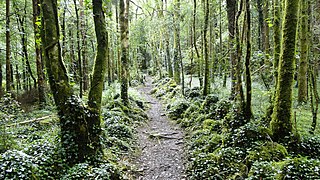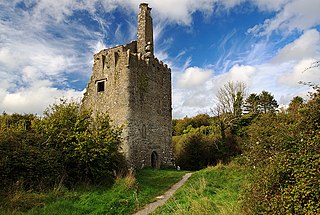Related Research Articles

The A1 is a major route in Northern Ireland. It runs from Belfast via Lisburn and Banbridge to the border with the Republic of Ireland south of Newry, from where the road continues to Dublin, becoming the N1 road and M1 motorway. Between Sprucefield and Carrickcarnan the road forms part of the European route E01.


Dromore is a town, townland and civil parish in County Tyrone, Northern Ireland. It is nine miles (14 km) south west of Omagh on the A32 and sixteen miles (26 km) from Enniskillen. The population of Dromore was 1,198 at the 2011 Census.

Dromore is a small market town and civil parish in County Down, Northern Ireland. It lies within the local government district of Armagh City, Banbridge and Craigavon. It is 19 miles (31 km) southwest of Belfast, on the A1 Belfast–Dublin road. The 2011 Census recorded a population of 6,003.
Events from the year 1641 in Ireland.

Dromore St Dympna's is a Gaelic Athletic Association club based in the village of Dromore in County Tyrone, Northern Ireland.

The Diocese of Dromore is a Roman Catholic diocese in Northern Ireland. It is one of eight suffragan dioceses which are subject to the Metropolitan Archdiocese of Armagh.
Sir Clarence Johnston Graham, 1st Baronet was a businessman and an Ulster Unionist Party politician in Northern Ireland.

The Diocese of Down and Dromore is a diocese of the Church of Ireland in the south east of Northern Ireland. It is in the ecclesiastical province of Armagh. The geographical remit of the diocese covers half of the City of Belfast to the east of the River Lagan and the part of County Armagh east of the River Bann and all of County Down.
The Bishop of Down and Dromore is the Ordinary of the Church of Ireland Diocese of Down and Dromore in the Province of Armagh. The diocese is situated in the north east of Ireland, which includes all of County Down, about half of the city of Belfast, and some parts of County Armagh east of the River Bann.
The Bishop of Dromore is an episcopal title which takes its name after the original monastery of Dromore in County Down, Northern Ireland. In the Roman Catholic Church the title still continues as a separate bishopric, but in the Church of Ireland it has been united with other bishoprics.
William Shaw Kerr was an Irish Anglican bishop, the first Bishop of Down and Dromore in the Church of Ireland.
Gordon McMullan is an Anglican bishop and author.
Banbridge District Council was the local authority of Banbridge in Northern Ireland. It was created in 1973 when the Local Government (Boundaries) Act 1971 came into force. In May 2015, it merged with Armagh City and District Council and Craigavon Borough Council to form one of 11 new local government units. The new council area was named Armagh, Banbridge and Craigavon District Council.
Nicholas Greaves, D.D. (1605?–1673) was an English churchman who was Dean of Dromore cathedral, County Down.
The Dean of Dromore has responsibility for Dromore Cathedral in the Diocese of Down and Dromore in the Church of Ireland.
Thomas Kelly was an Irish prelate of the Roman Catholic Church. He served as Bishop of Dromore from 1826 to 1828 and Archbishop of Armagh from 1828 to 1835.

Eamon Columba Martin KC*HS is a Northern Irish Catholic prelate from Northern Ireland who has served as Archbishop of Armagh and Primate of All Ireland since 2014.

Dromore, County Clare is a rural townland in County Clare in the Republic of Ireland. It is located in the parish of Ruan and was formerly the location of Dromore House. Today, most of the townland is accounted for by Dromore Wood Nature Reserve. It is open to the public and also contains the ruins of Dromore Castle.

Dromore Castle is a tower house and National Monument located between the towns of Crusheen and Corofin in County Clare, Ireland.
References
- ↑ Crockford's Clerical Directory 2016/17 p794: London, Church House, 2015 ISBN 9780715110980